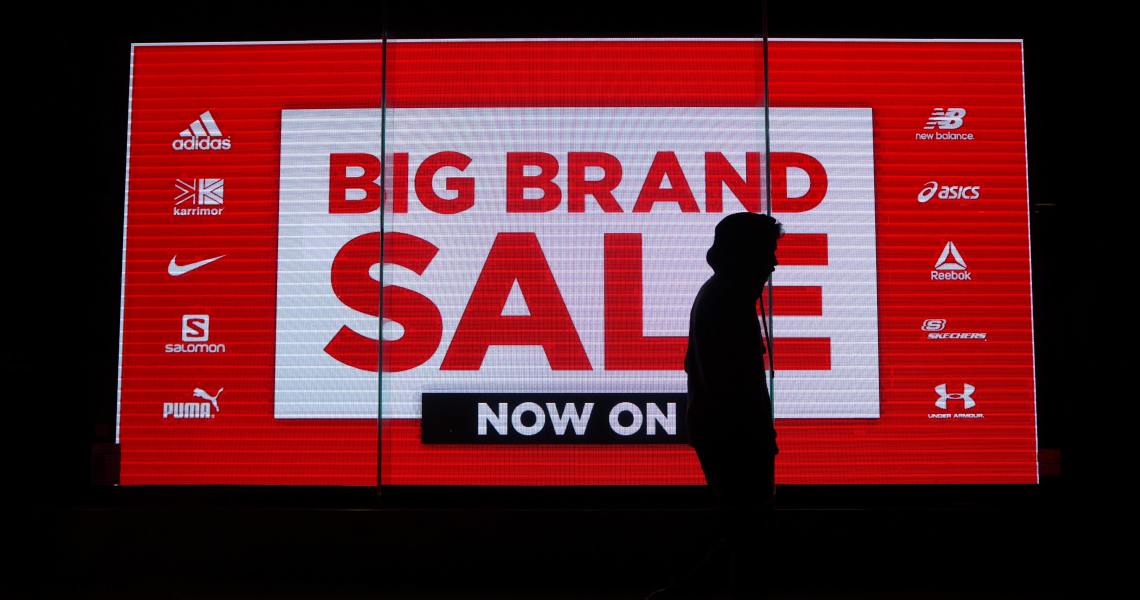Black Friday is falling out of fashion, based on consumer values and behavior.
The discounting holiday that was once consolidated to Black Friday has grown for many brands to be an event spanning at least two weeks. The discounts themselves, therefore, tend to be less compelling. What’s more, the whole idea of the holiday conflicts with the emerging conscious consumers’ values.
This holiday season, despite that fact that brands are dealing with a glut of excess product, early results show that most apparel discounts aren’t exceeding 33%. What’s more, 30% of products across all products categories were already on sale in the first week of November, according to a joint global report by DataFeedWatch and cart.com.
“Black Friday is the epitome of everything that’s ultimately wrong with consumption,” said Rachel Arthur, sustainability consultant and founder of sustainability platform FashMash. “There is, of course, an element of necessity for businesses to do sales and move stock, but markdowns just to shift product plays into the overproduction [problem].”
The reason Black Friday sales are now ubiquitous from October through November is excess inventory, said Shawn Grain Carter, luxury branding and retail industry consultant and associate professor of fashion business management at the Fashion Institute of Technology. That’s been driven by consumer demand receding, due to rising inflation and bank interest rates forcing consumers to stretch their dollars. According to Census Bureau data, U.S. clothing stores had 24.1% more inventory in September 2022 compared to a year earlier.
As backlash against the day grows, many companies are working to counter the discounting event. In partnership, Swiss bag brand Freitag, Mud Jeans, British fashion brand Raeburn and other lifestyle brands are closing their e-commerce sites for the day and hosting anti-consumption events throughout the holiday weekend. Freitag will host a swap, while Raeburn will host clothing repair workshops. They will be promoting each other’s events through social media.
According to Elisabeth Isenegger, a Freitag representative, there are few things that have less in common with the circular economy than Black Friday. “We prefer to focus on long-lasting products and sensible services and refuse to get involved in wasteful discount battles,” she said. Since 2019, the brand has taken a stance against Black Friday with a “Don’t shop, just S.W.A.P” campaign, encouraging customers to swap products for free.
Ad position: web_incontent_pos1
David Python, co-founder of footwear brand Cariuma, said heavy discounting and the vicious promotional cycle is a poison to brand building. “Moreover, it is a serious barrier to advancing the sustainability agenda in fashion,” he said. “The inherent costs of adopting better materials, better wages and overall more responsible practices cannot be sustained while discounting products at 70-80%, as I have seen in the last months.”
For Black Friday, Cariuma is inverting that cycle. Instead of slashing prices and driving consumption, it’s increasing the number of trees it plants for every shoe it sells from one to 10, while keeping items at full price.
Footwear brand Thesus is also boycotting Black Friday but not discouraging purchases, as its founders see Black Friday 2022 as a time when customers may need to shop for discount purchases due to having a smaller disposable income. The brand’s Be Outside campaign instead encourages people to go outside for a break during the shopping holiday and record it. When they tag their post on Instagram, they get a $50 voucher to shop the brand. “Black Friday creates a frenzy. It creates the belief that you may have to go into debt right now in order to get what you want because it’s on discount, as opposed to being more thoughtful about your choices and consumption,” said Sofi Khwaja-Horekens, co-founder and CEO of Thesus.
The frenzy is especially prevalent in fast fashion. As a result, resale is fighting back: Resale marketplace Vestiaire Collective announced on November 22 that it is banning fast fashion from its platform, as the items have no resale value. Dounia Wone, Vestiaire Collective’s chief impact officer, called this week the overconsumption rendez-vous of the year.
“Black Friday is the perfect opportunity to share an activist message with our global community and beyond. Fast fashion stands for the exact opposite of what we believe in,” said Wone. “At Vestiaire, we treasure craftsmanship and durability, and we think the industry should produce less and higher quality items. There is no value in fast fashion, even in resale. By banning fast fashion brands from the platform when Black Friday is [top of mind], we are reinforcing the notion of buying quality over quantity and encouraging our community to invest in craftsmanship at better prices.”




